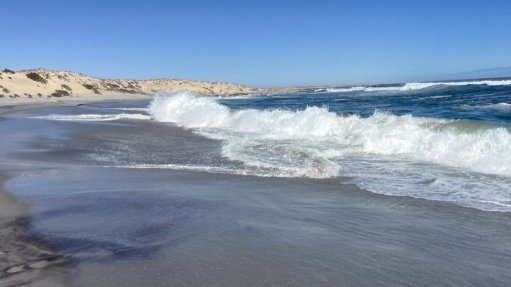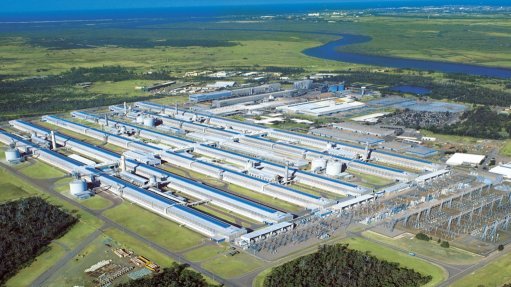New Minister commits to continuing water-sector reforms initiated by predecessor
Newly appointed Water and Sanitation Minister Pemmy Majodina has affirmed that the various reforms and improvements initiated by her predecessor Senzo Mchunu, who is now Police Minister, will be continued.
Majodina was appointed Water and Sanitation Minister on June 30, following the formation of South Africa’s seventh administration under the government of national unity.
David Mahlobo retained his position as Water and Sanitation Deputy Minister, while Isaac Sello Seitlholo replaced Judith Tshabalala, who moved to Deputy Minister of Mineral and Petroleum Resources.
At the time of Majodina’s appointment as Water and Sanitation Minister, Mchunu, who was appointed in August 2021, was actively tackling the years-long deterioration of South Africa’s water sector, which is fast becoming one of the biggest challenges facing the country.
The former Water and Sanitation Minister led the Department of Water and Sanitation (DWS) through many changes, including the resuscitation of the Blue, Green and No Drop reports, the establishment of the National Water Resources Infrastructure Agency and Water Partnership Office, and making key amendments to the National Water Act and Water Services Act Amendment Bills, besides others.
Tabling the DWS’s Budget Vote on July 12, Majodina said that many of the reforms that would be continued were mandated by the National Development Plan and the Presidency’s Operation Vulindlela.
“I would like to make it clear that it is my intention to ensure that there is continuity of the various reforms and improvements that were initiated by my predecessor,” she assured.
These include the Blue, Green and No Drop reports, which were revived by Mchunu in 2021, and had revealed the deteriorating state of South Africa’s water sector, said Mahlobo.
“Minister Majodina has decided to continue with these Drop assessment as an important instrument to improve the performance of the sector.”
In addition, Majodina said that the DWS is focusing on three key priorities over the next few years to ensure that the availability of water does not become a constraint to investment and economic growth, and that there is sufficient water to meet the needs of South Africa’s population.
These include timeous investment in additional water resource infrastructure to capture the remaining 25% of South Africa’s exploitable surface water resources; diversifying the country’s water mix and increasingly making use of other sources of water, such as groundwater, water reuse and desalination; and implementing more effective water conservation and demand management programmes to bring the water consumption per capita levels in line with, or below, the international average.
Further, the many water resource infrastructure projects which are in various stages of implementation – from the fundraising and design phases to construction – will continue, building upon Mchunu’s efforts to unblock projects that had stalled and accelerating the implementation of those that had slowed.
“Of importance is also to note that all the water resource infrastructure projects in the implementation phase have been preceded by thorough planning, including reconciliation of water availability and requirements to meet national social and economic development objectives,” Majodina pointed out.
This planning is informed by scientific data on our water resources, and during this financial year, the department will be strengthening and increasing its investment in its water resource monitoring infrastructure, equipment and systems.
Among the projects under way are the new R26-billion Upper uMkhomazi dam and associated works, which will provide urgently needed additional water to eThekwini and surrounding districts in KwaZulu-Natal, and the new R1.8-billion Cwabeni off-channel storage dam, which will provide additional water to Port Shepstone and surrounding areas in KwaZulu-Natal, besides many others.
“We are also implementing the R24-billion Olifants river water resource development project in Limpopo and the R10-billion Vaal Gamagara Phase 2 project in the Northern Cape,” she commented.
“These two projects are being implemented in partnership with the mining sector, with joint funding by government and the mines. Both projects will increase water supply and ensure water security to enable investment in mining. Communities adjacent to the bulk pipelines will also benefit from these projects.”
“We are making good progress in unblocking and accelerating the delayed projects, but more still needs to be done to address this problem,” says Mahlobo.
He further commented that investment in both bulk water supply infrastructure and municipal water reticulation will be prioritised to ensure that 10% of the country’s population currently without access to water is provided with access as quickly as possible.
“We are on course to create a conducive environment for water security through the harnessing of the social and productive potential of water to the benefit of all, ensuring its destructive potential is sufficiently contained, but equally, we are the first to admit that South Africa cannot yet be considered fully water secure.”
Seitlholo added that the challenges will take time to address and it is crucial that the seventh administration, under the government of national unity, intensifies efforts and responds aggressively.
“The country requires about R90-billion per year for the next decade to close the water infrastructure deficit. This means that the country’s water and sanitation infrastructure requires R900-billion over the next decade to be up to standard.”
Article Enquiry
Email Article
Save Article
Feedback
To advertise email advertising@creamermedia.co.za or click here
Press Office
Announcements
What's On
Subscribe to improve your user experience...
Option 1 (equivalent of R125 a month):
Receive a weekly copy of Creamer Media's Engineering News & Mining Weekly magazine
(print copy for those in South Africa and e-magazine for those outside of South Africa)
Receive daily email newsletters
Access to full search results
Access archive of magazine back copies
Access to Projects in Progress
Access to ONE Research Report of your choice in PDF format
Option 2 (equivalent of R375 a month):
All benefits from Option 1
PLUS
Access to Creamer Media's Research Channel Africa for ALL Research Reports, in PDF format, on various industrial and mining sectors
including Electricity; Water; Energy Transition; Hydrogen; Roads, Rail and Ports; Coal; Gold; Platinum; Battery Metals; etc.
Already a subscriber?
Forgotten your password?
Receive weekly copy of Creamer Media's Engineering News & Mining Weekly magazine (print copy for those in South Africa and e-magazine for those outside of South Africa)
➕
Recieve daily email newsletters
➕
Access to full search results
➕
Access archive of magazine back copies
➕
Access to Projects in Progress
➕
Access to ONE Research Report of your choice in PDF format
RESEARCH CHANNEL AFRICA
R4500 (equivalent of R375 a month)
SUBSCRIBEAll benefits from Option 1
➕
Access to Creamer Media's Research Channel Africa for ALL Research Reports on various industrial and mining sectors, in PDF format, including on:
Electricity
➕
Water
➕
Energy Transition
➕
Hydrogen
➕
Roads, Rail and Ports
➕
Coal
➕
Gold
➕
Platinum
➕
Battery Metals
➕
etc.
Receive all benefits from Option 1 or Option 2 delivered to numerous people at your company
➕
Multiple User names and Passwords for simultaneous log-ins
➕
Intranet integration access to all in your organisation


















